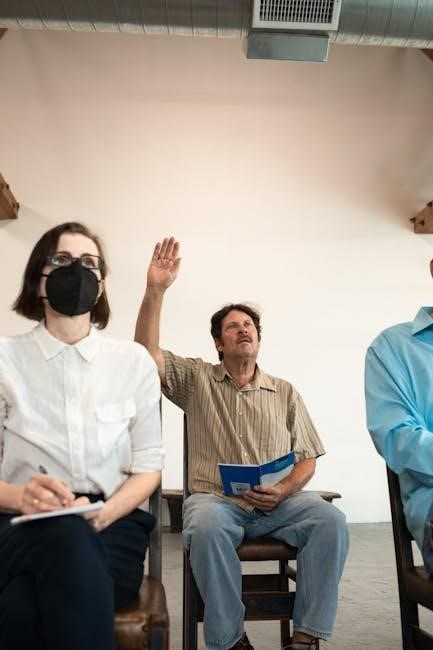The Technician Class License is the entry-level amateur radio license issued by the FCC‚ allowing operation on specific frequencies․ It is the first step for many to explore ham radio․
The question pool for the Technician Class License is a curated collection of exam questions‚ updated periodically to reflect current FCC regulations and technological advancements․
Mastering the question pool with answers is essential for preparation‚ as it familiarizes candidates with the exam format and content‚ ensuring confidence and readiness for the test․
Available in PDF and other formats‚ the question pool‚ along with study guides and online resources‚ provides comprehensive materials for successful exam preparation;
Passing the Technician Class License exam opens doors to emergency communication‚ experimentation‚ and community engagement‚ making it a valuable asset for amateur radio enthusiasts․
Overview of the Technician Class License
The Technician Class License is the FCC’s entry-level amateur radio certification‚ granting access to various communication frequencies․ It is ideal for beginners‚ requiring passage of a 35-question exam with a 26-correct minimum․ The question pool‚ updated every four years‚ ensures exams reflect current regulations and technologies․ Study materials‚ including PDF guides‚ offer structured preparation․ This license enables operation on HF‚ VHF‚ UHF‚ and satellite bands‚ making it a gateway to emergency communication‚ experimentation‚ and community engagement․ Its accessibility and utility make it a popular starting point for amateur radio enthusiasts․
Importance of the Question Pool with Answers
The Technician Class License question pool with answers is a vital resource for exam preparation․ It contains all possible questions and correct responses‚ ensuring candidates are familiar with the exam format and content․ Regular updates reflect changes in FCC regulations and amateur radio practices․ By studying the question pool‚ applicants can identify knowledge gaps and focus on key areas․ This structured approach significantly improves readiness and confidence‚ maximizing the likelihood of passing the exam․ Accessing the pool in PDF and other formats provides convenience for self-study and targeted practice‚ making it an indispensable tool for success․
Structure of the Technician Class Question Pool
The Technician Class Question Pool is divided into subelements‚ each covering specific topics like FCC rules‚ operating practices‚ and technical knowledge․ It contains 462 questions‚ with 35 used in the exam․ Questions are weighted to ensure balanced coverage of key areas․ The pool is updated every four years to reflect regulatory changes and advancements in amateur radio technology‚ ensuring relevance and accuracy for candidates preparing for the exam․
Effective Date and Validity Period
The Technician Class Question Pool is effective from July 1‚ 2022‚ to June 30‚ 2026․ This period ensures the exam reflects current FCC regulations and amateur radio practices․
Every four years‚ the question pool is updated to incorporate new rules‚ technologies‚ and operating standards․ The validity period allows candidates to study with confidence‚ knowing the material aligns with FCC requirements during their exam preparation․
Subelements and Weightage in the Question Pool
The Technician Class Question Pool is divided into subelements‚ each focusing on specific topics․ These include FCC rules‚ operating practices‚ and technical topics like electronics and antennas․
Subelements are weighted to ensure a balanced exam․ For example‚ FCC rules and regulations account for a smaller portion‚ while operating practices and technical knowledge form the majority of questions․
This structure helps candidates focus their study efforts on areas with higher weightage‚ ensuring they are well-prepared for the exam format and content․
Number of Questions and Passing Requirements
The Technician Class License exam consists of 35 multiple-choice questions‚ covering topics from the question pool․ To pass‚ candidates must correctly answer at least 26 questions‚ representing approximately 74% accuracy․
The questions are divided among subelements‚ ensuring a comprehensive understanding of amateur radio operations․ This structured approach helps candidates gauge their knowledge and focus on areas needing improvement․ The passing requirement reflects the FCC’s commitment to ensuring operators are well-prepared for safe and effective communication practices․ Proper preparation using the question pool and study guides significantly enhances the likelihood of achieving this required score․ The exam duration is typically 30 minutes‚ allowing ample time for careful consideration of each question․
FCC Rules and Regulations
FCC Rules and Regulations govern amateur radio operations‚ ensuring compliance with legal standards and safe communication practices․ These rules are essential for maintaining order in radio spectrum usage․
Licensing and Operating Privileges
The Technician Class License grants privileges to operate on specific amateur radio frequency bands‚ enabling communication locally and globally․ Licensees can transmit using various modes‚ including voice‚ digital‚ and Morse code‚ within FCC-regulated power limits․ The license is issued for a ten-year term‚ with renewal options to maintain operational privileges․ Understanding these privileges is crucial for compliance with FCC rules and responsible radio operation․
To obtain the license‚ candidates must pass a 35-question exam‚ with at least 26 correct answers‚ covering FCC regulations‚ operating practices‚ and technical knowledge․ The question pool provides the basis for these exams‚ ensuring consistency and fairness in testing․ Proper licensing ensures legal operation and access to amateur radio frequencies‚ fostering a community of responsible and informed operators․
Station Identification and Transmission Standards
Amateur radio operators holding a Technician Class License must adhere to strict station identification and transmission standards․ FCC regulations require stations to identify themselves every 10 minutes during transmission and at the end of communication․ This ensures accountability and compliance with federal rules․ The question pool emphasizes these standards‚ testing knowledge of proper identification procedures and transmission protocols․ Understanding these requirements is crucial for legal operation and avoiding penalties․ The exam questions cover topics such as call sign usage‚ transmission power limits‚ and frequency accuracy‚ ensuring operators maintain high standards of professionalism and regulatory compliance in their communications․
Frequency Allocations and Band Plans
The Technician Class License exam includes questions on frequency allocations and band plans‚ ensuring operators understand authorized frequencies․ Key allocations include the 6-meter band at 52․525 MHz and the 2-meter band at 146․52 MHz․ These allocations are critical for proper communication and avoiding interference․ The question pool provides detailed information on these topics‚ helping candidates grasp the FCC’s frequency rules․ Understanding band plans is essential for legal operation and effective communication within amateur radio communities․ The exam tests knowledge of frequency privileges‚ ensuring Technician Class licensees operate responsibly and within designated ranges․ This knowledge is vital for compliant and efficient use of the amateur radio spectrum․

Operating Practices
Operating practices cover essential skills for effective communication‚ including station setup‚ safety precautions‚ and protocol adherence․ Proper techniques ensure efficient and compliant amateur radio operations․
Station Setup and Safety Precautions
Proper station setup and safety precautions are critical for amateur radio operations․ Grounding equipment ensures electrical safety and prevents damage from lightning strikes․ Understanding power supply configurations and circuit protection is vital to avoid overvoltage or electrical hazards․ Regular inspection of antennas and transmission lines helps maintain system integrity․ Safety measures include proper handling of RF emissions to comply with FCC guidelines and avoiding exposure to harmful radiation levels․ Keeping flammable materials away from equipment and ensuring a fire-safe environment are essential practices․ Adhering to these precautions ensures reliable operation and protects both the operator and equipment from potential risks․
Communication Techniques and Protocols
Effective communication techniques and protocols are fundamental in amateur radio operations․ Understanding various modes‚ such as voice‚ Morse code‚ and digital communication‚ enhances operational versatility․ Proper use of call signs‚ signal reporting‚ and Q-codes ensures clarity and efficiency․ Protocols like net operations and emergency communication procedures are essential for coordinated efforts․ Familiarity with frequency bands and propagation characteristics allows operators to optimize transmissions․ Adhering to FCC regulations and best practices promotes respectful and efficient use of the amateur spectrum․ These skills are critical for clear‚ concise‚ and effective communication in both routine and emergency situations․
Emergency and Distress Communication
Emergency and distress communication is a critical aspect of amateur radio operations․ Operators must understand protocols for transmitting distress signals‚ such as MAYDAY and PAN-PAN‚ to alert authorities and request assistance․ Knowing how to clearly and calmly communicate during emergencies ensures effective assistance․ The Technician Class License exam emphasizes the importance of adhering to FCC regulations regarding emergency transmissions․ Amateur radio often serves as a vital communication link when traditional systems fail․ Proper training and practice in emergency communication techniques are essential for providing reliable assistance during crises․
Technical Topics
The Technician Class License covers essential technical topics like radio theory‚ basic electronics‚ antennas‚ and transmission lines․ These fundamentals are crucial for understanding signal propagation and circuit functionality․
Radio Theory and Electronics Basics
Radio theory and electronics basics are fundamental to the Technician Class License curriculum․ Topics include understanding electrical circuits‚ resistors‚ capacitors‚ and inductors․ Ohm’s Law and power calculations are essential concepts․ Signal propagation‚ wave types‚ and antenna theory are also covered․ The question pool provides multiple-choice questions on these topics‚ ensuring candidates grasp the principles of radio communication․ Electronics basics‚ such as circuit diagrams and component identification‚ are tested to ensure practical understanding․ Familiarity with these concepts is crucial for operating amateur radio equipment effectively and safely‚ making them a core part of the Technician Class License exam․
Antennas and Transmission Lines
Antennas and transmission lines are critical components in amateur radio systems․ The question pool covers various antenna types‚ including dipoles‚ verticals‚ and Yagi antennas‚ and their characteristics․ Transmission line theory‚ such as impedance matching and SWR (Standing Wave Ratio)‚ is also emphasized․ Candidates are tested on concepts like feedline types‚ coaxial cable properties‚ and antenna safety․ Understanding how antennas radiate signals and how transmission lines efficiently carry RF energy is essential for effective communication․ The Technician Class License exam ensures operators can configure and troubleshoot antenna systems‚ optimizing performance for reliable radio operation․
Power Supplies and Circuit Protection
Power supplies are essential for providing stable DC voltage to amateur radio equipment․ The question pool covers types of power supplies‚ including linear‚ switching‚ and battery-based systems․ Voltage regulation and filtering are emphasized to ensure reliable operation․ Circuit protection devices‚ such as fuses and circuit breakers‚ are discussed to prevent damage from overcurrent conditions․
Understanding proper wiring and safety practices‚ like using appropriate gauge wire and avoiding ground loops‚ is critical․ The Technician Class License exam ensures operators can safely configure and maintain power systems‚ protecting equipment and ensuring efficient performance during transmission and reception․

Question Pool with Answers
The Technician Class License question pool with answers is available in PDF format‚ containing all exam questions and correct answers for self-study and preparation․
Accessing the Official Question Pool
The official Technician Class License question pool with answers is available for download in PDF format from the ARRL website and other authorized platforms․
The pool‚ valid from July 1‚ 2022‚ to June 30‚ 2026‚ contains 426 questions covering all exam topics‚ with correct answers provided for self-study and preparation․
Users can access the PDF free of charge for non-commercial use‚ making it an essential resource for candidates aiming to pass the Technician Class exam․
Additionally‚ platforms like HamStudy․org offer interactive tools to practice questions‚ ensuring thorough preparation for the FCC exam․
Understanding the Format of Questions and Answers
The Technician Class License exam questions are multiple-choice‚ with each question offering four possible answers and one correct response․
In the official question pool‚ each question is followed by its correct answer‚ enabling candidates to identify areas requiring further study․
The questions are organized by subelements‚ such as FCC rules‚ operating practices‚ and technical topics‚ ensuring structured and comprehensive preparation․
Practicing with these formatted questions helps candidates familiarize themselves with the exam structure‚ improving their ability to manage time effectively during the test․
Using the Question Pool for Self-Study
The Technician Class License question pool is an essential resource for self-study‚ offering access to the exact questions and answers used in exams․
By reviewing the pool‚ candidates can identify knowledge gaps and focus on areas requiring improvement‚ ensuring a well-rounded understanding of the material․
Regular practice with the question pool helps build familiarity with the exam format and timing‚ reducing anxiety during the actual test․
Utilizing the pool alongside study guides and online platforms provides a comprehensive approach to preparation‚ maximizing the chances of passing the exam․

Study Resources and Guides
Popular resources include the ARRL Ham Radio License Manual and the No-Nonsense Technician Class License Study Guide‚ offering structured learning and practice exams for effective preparation․
ARRL Ham Radio License Manual
The ARRL Ham Radio License Manual is the official study guide for the Technician Class License‚ offering a comprehensive and structured approach to mastering the question pool․
It covers the entire question pool with detailed explanations‚ diagrams‚ and practice exams‚ ensuring candidates understand key concepts and regulations․ The manual is updated regularly to reflect FCC changes‚ making it a reliable resource for exam preparation․
With clear instructions and organized content‚ it helps aspiring amateurs navigate the licensing process confidently․ The included answer keys and explanations further aid in reviewing and improving understanding of the material․
This manual is an essential tool for anyone seeking to obtain their Technician Class License and begin their amateur radio journey․
No-Nonsense Technician Class License Study Guide
The No-Nonsense Technician Class License Study Guide is a concise and practical resource designed to simplify exam preparation․ Available as a free PDF‚ it focuses on essential topics from the question pool‚ ensuring efficient learning․ The guide includes flashcards‚ practice exams‚ and straightforward explanations‚ making it ideal for self-study․ By organizing content logically‚ it helps candidates identify and master weak areas․ Updated regularly to align with FCC changes‚ this guide complements the official question pool and manuals‚ offering a no-frills approach to achieving licensure․ Its clear‚ direct format makes it a valuable tool for aspiring technicians․
Online Platforms for Practice Exams
Online platforms like HamStudy․org and QRZ․com offer comprehensive practice exams tailored to the Technician Class License question pool․ These tools simulate real exam conditions‚ allowing candidates to assess their readiness․ They provide immediate scoring‚ detailed explanations‚ and progress tracking․ Many platforms include timed sessions and randomized questions‚ mirroring the actual test environment․ Additionally‚ they often complement the official question pool PDF by offering interactive learning aids․ These resources are indispensable for identifying weak areas and refining study strategies‚ ensuring candidates are well-prepared for the exam․ Regular use of these platforms significantly boosts confidence and success rates․

Preparing for the Exam
Effective preparation involves creating a structured study plan and consistently reviewing the question pool․ Utilize practice exams to assess readiness and identify areas needing improvement․ Focus on understanding FCC rules‚ radio theory‚ and operating practices to build a strong foundation for success․
Creating a Study Schedule
A well-structured study schedule is crucial for effective preparation․ Allocate dedicated time daily to review the Technician Class question pool with answers․ Break down topics into manageable sections‚ focusing on FCC rules‚ radio theory‚ and operating practices․ Set realistic goals‚ such as mastering a specific subelement each week․ Incorporate practice exams to simulate test conditions and identify weak areas․ Regular review of the question pool ensures familiarity with exam format and content․ Consistency is key to retaining information and building confidence for the exam․ A structured plan helps manage time efficiently‚ ensuring thorough preparation․
Effective Learning Strategies
Effective learning strategies involve active engagement with study materials․ Use the Technician Class question pool with answers to identify key concepts and frequently tested topics․ Practice recalling information without notes‚ enhancing retention․ Join study groups or online forums to discuss challenging topics․ Utilize flashcards for quick reviews of terms and formulas․ Regularly take practice exams to assess progress and focus on weak areas․ Teach concepts to others to deepen understanding․ Consistency and varied study methods ensure comprehensive preparation for the exam․
Importance of Practicing with Sample Questions
Practicing with sample questions from the Technician Class License question pool is crucial for exam success․ It helps familiarize yourself with the exam format‚ reducing test-day anxiety․ Regularly reviewing sample questions allows you to identify weak areas and focus your study efforts effectively․ By simulating exam conditions‚ you improve time management and decision-making skills․ Additionally‚ practicing with sample questions ensures you understand the structure and phrasing of questions‚ enabling better comprehension․ Utilizing online platforms and study guides alongside the official question pool enhances your preparedness and confidence in tackling the actual exam․

Exam Administration
The Technician Class License exam is proctored by FCC-accredited Volunteer Examiner Coordinators (VECs)․ It consists of 35 multiple-choice questions‚ with a passing requirement of 26 correct answers․ The exam is typically administered in person‚ though online options exist․ Candidates must present valid identification and pay a small fee․ The question pool ensures fairness and consistency across all exams․ Upon passing‚ the FCC issues the license‚ valid for 10 years‚ with renewal options available to maintain operating privileges․
VEC Exams and Testing Procedures
VEC (Volunteer Examiner Coordinator) exams are administered by FCC-accredited organizations to test candidates for the Technician Class License․ The exam consists of 35 multiple-choice questions drawn from the official question pool․ To pass‚ candidates must correctly answer at least 26 questions; Exams are typically conducted in person‚ but online testing options are available under specific conditions․ Candidates must provide valid identification and pay a nominal fee‚ usually $15‚ to cover administrative costs․ The question pool ensures consistency and fairness in testing․ Upon passing‚ the FCC issues the license‚ which is valid for 10 years‚ with renewal options available to maintain operating privileges․
Required Documentation and Fees
To take the Technician Class License exam‚ candidates must present valid identification‚ such as a government-issued ID․ A completed FCC Form 605 is typically required‚ outlining personal and contact information․ The exam fee‚ usually $15‚ covers administrative costs․ Additional documentation‚ like a Certificate of Completion from an FCC-approved training course‚ may be optional but recommended․ Applicants with expired licenses can renew within a 2-year grace period without retesting․ Ensuring all documents are accurate and fees are paid is crucial for a smooth testing experience and timely license issuance․
Post-Exam Procedures and License Issuance
After passing the Technician Class License exam‚ the VEC collects the paperwork and fees for processing․ The FCC typically issues the license within 10 business days․ The license is recorded in the FCC’s Universal Licensing System (ULS) database‚ making it legally valid․ Once issued‚ the license is valid for 10 years․ Applicants receive a digital copy of their license‚ which can be downloaded from the FCC website․ This document serves as official proof of certification‚ enabling operation on designated amateur radio frequencies․ Regular updates to the ULS ensure the license remains current and accessible for verification purposes․

License Maintenance and Renewal
The Technician Class License is valid for 10 years‚ with a grace period for renewal after expiration․ Renewal involves updating information and paying fees․
Licensing Term and Renewal Process
The Technician Class License is granted for a term of 10 years‚ after which renewal is required to maintain operating privileges․ The renewal process involves submitting the appropriate forms and fees to the FCC‚ ensuring all information is up-to-date․ Licenses can be renewed online through the FCC’s Universal Licensing System (ULS)‚ making the process efficient and accessible․ Renewal is straightforward for active operators‚ allowing continued use of amateur radio frequencies without interruption․
A grace period is provided for late renewal‚ enabling licensees to update their status even after expiration․ Proper documentation and timely renewal ensure uninterrupted ham radio operations and compliance with FCC regulations․
Grace Period for License Expiration
A grace period is provided following the expiration of an amateur radio license‚ allowing licensees to renew their credentials without penalty․ During this period‚ operators may continue to use their call sign and frequencies temporarily‚ ensuring uninterrupted communication services․ This grace period is designed to accommodate delays in renewal processes‚ particularly for those involved in emergency communication efforts․
The FCC specifies the length of the grace period‚ during which the license remains valid for renewal purposes․ Renewing within this timeframe prevents the loss of operating privileges and ensures compliance with FCC regulations․ The grace period underscores the importance of maintaining valid licensure to continue contributing to the amateur radio community and its vital services․
Updating License Information
Keeping license information up-to-date is crucial for maintaining valid amateur radio privileges․ The FCC requires licensees to update their information‚ such as address or name changes‚ within a specific timeframe․ Failure to do so may result in communication disruptions or legal consequences․ Licensees can update their details through the FCC’s Universal Licensing System (ULS) database‚ ensuring seamless renewal and compliance with regulations․
Regular updates also ensure that license holders receive important notifications‚ such as renewal reminders or regulatory changes․ Accurate records help maintain the integrity of the amateur radio service and prevent potential penalties or license revocation․ Timely updates are essential for continued operation under FCC guidelines․

Additional Resources
Additional resources‚ such as community-edited question pools and interactive study tools‚ complement the official Technician Class License study materials․ These tools enhance learning and exam preparation․
Ham radio clubs and mentorship programs provide hands-on experience and guidance‚ aiding newcomers in mastering the question pool and understanding practical applications of amateur radio operations․
Community-Edited Question Pools
Community-edited question pools are valuable resources for Technician Class License preparation․ These pools‚ often maintained by amateur radio enthusiasts‚ provide updated and curated questions․
They are available in formats like PDF and are accessible on platforms such as hamstudy․org․ Community-edited pools align with the official question pool‚ ensuring relevance and accuracy․
These resources are particularly useful for identifying trends in exam questions and understanding common topics․ They complement official study guides‚ offering a diverse learning experience․
Community contributions ensure that the question pools remain current and reflect real-world exam scenarios‚ aiding candidates in their preparation effectively․
Interactive Study Tools and Apps
Interactive study tools and apps are essential for modern Technician Class License preparation․ Platforms like HamStudy․org offer dynamic question pools and practice exams‚ mirroring the official format․
These tools provide real-time feedback‚ progress tracking‚ and focused study sessions based on weak areas․ Apps often include flashcards‚ video tutorials‚ and community discussions‚ enhancing learning engagement․
Many apps integrate the official question pool with answers‚ ensuring candidates master the material․ Their accessibility on mobile devices makes studying convenient and flexible․
By leveraging technology‚ these tools simplify complex topics and personalize the learning experience‚ helping candidates prepare efficiently for the Technician Class License exam․
Ham Radio Clubs and Mentorship Programs
Ham radio clubs and mentorship programs are invaluable resources for aspiring Technician Class License holders․ These clubs provide hands-on experience‚ workshops‚ and guidance from experienced operators․ Mentors offer personalized support‚ helping newcomers understand complex topics and prepare for exams․ Many clubs organize study sessions‚ practice exams‚ and equipment demonstrations‚ fostering a supportive learning environment․ Participating in these programs enhances technical knowledge and builds confidence‚ making the journey to obtaining a Technician Class License more enjoyable and rewarding․ They also encourage camaraderie among members‚ creating a strong sense of community within the amateur radio world․
The Technician Class License question pool with answers PDF is a vital resource for exam preparation‚ offering insights into FCC regulations and amateur radio operations․
Final Tips for Success
To excel in the Technician Class License exam‚ consistent study and practice are essential․ Utilize the question pool with answers to familiarize yourself with the format and content․ Regularly review FCC regulations and technical topics to build a strong foundation․ Practice with online platforms and mock exams to assess your readiness․ Focus on understanding concepts rather than memorizing answers․ Join study groups or seek mentorship for clarification on challenging topics․ Stay calm during the exam and carefully read each question․ By following these strategies‚ you’ll be well-prepared to achieve success and earn your Technician Class License․
Staying Updated with FCC Changes
Regularly checking for updates from the FCC is crucial for Technician Class License candidates․ The FCC periodically revises regulations and the question pool‚ so staying informed ensures exam readiness․ Subscribe to the FCC’s official updates or visit their website for the latest changes․ Additionally‚ the ARRL website provides timely updates on modifications to the question pool and licensing rules‚ helping candidates stay current and prepared for their exams․
Updates often include changes in frequency allocations‚ operating privileges‚ or new regulations․ By staying updated‚ candidates can avoid surprises on exam day and ensure compliance with the latest FCC requirements․ Regular review of the question pool with answers also helps identify any changes‚ ensuring a smooth exam experience․





